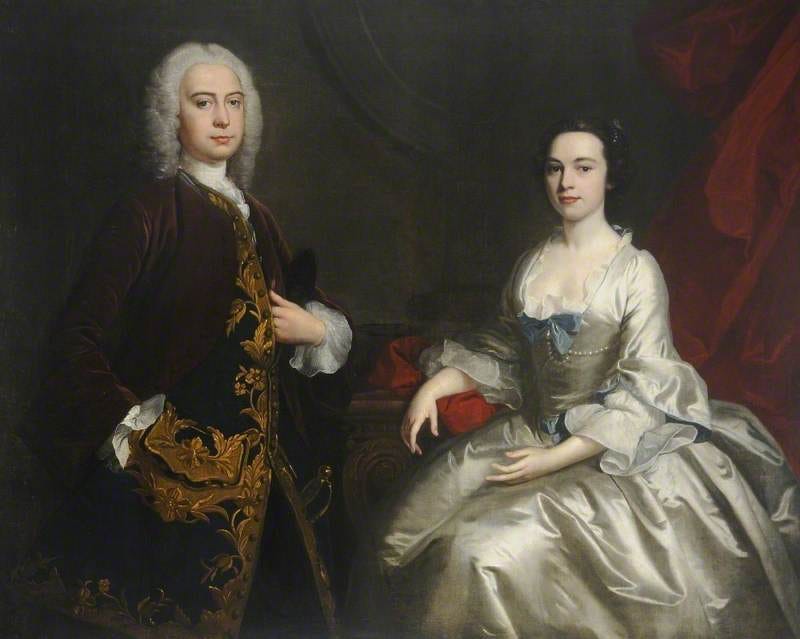Dear friends,
The last two weeks have been almost entirely devoted to Lovelace’s point of view and his contradictions are never ending. While he admits that in Clarissa’s presence she, “half assimilates me to her own virtue,” behind the scenes he is as scheming as ever. This week he has made himself violently ill to awaken Clarissa’s sympathy; and faked claims that Uncle John is ready to reunite her family once she and Lovelace are wed. It seems Clarissa has finally been won over, she has softened towards him, and at last appears ready to sign the settlements. Lovelace appears genuinely moved: “by my soul, I audibly sobbed.” Despite this, he still plans an assault on her virtue. Advised by the ‘nymphs’ he has seduced in the past, Lovelace resolves that he can make, “an attempt in the day.”
“They remind me that the situation of their house is such, that no noises can be heard out of it; and ridicule me for making it necessary for a lady to be undressed. It was not always so with me, poor old man! Sally told me; saucily slinging her handkerchief in my face.”
This latest scheme to promise a reconciliation with the Harlowe family has provided another opportunity for Richardson to show just how moral and good our Clarissa really is. She refuses to let her Uncle believe she is already married, even if that means putting the longed-for reconciliation in jeopardy; and presses upon Lovelace the foolishness of allowing this rumour to circulate.
“You see that you have not been able to return a direct answer to a plain and honest question, though upon it depends all the happiness you congratulate me upon the prospect of.”
In responding to such logic, Lovelace is forced to acknowledge that the truth would have him appear a liar and a rake.
These are exciting developments, but it’s Belford’s letter (number 192) that I found most provoking. It genuinely feels like we’re covering new ground when Belford offers up the male perspective on wives and mistresses, raising questions about inheritance, the legitimacy of children and the inevitable waining of male libido. In particular Belford draws attention to the iron fist with which mistresses are able to rule their lovers and the moral duty a man has to the women he seduces.
“Must not the man be a brute indeed, who can cast off a woman whom he has seduced (if he has taken her from town, that’s another thing), without some flagrant reason.”
Marriage might legally trap men, but good men ought to be just as easily ensnared by their ethics. Sadly, even here we see distinctions made between women according to class, occupation and ‘experience’. A man owes no such moral duty to a woman he has picked up in ‘town’. Even sadder, Lovelace dismisses Belford’s arguments about the problems of mistresses by suggesting this only applies to “low-bred” girls. He claims he would have no such difficulties living unwed with a woman like Clarissa.
In other developments, Anna has provided a possible escape plan via Mrs Townsend, a dealer in silks who has premises in Deptford; Uncle Anthony has made a formal marriage proposal to Anna’s mother; which Anna’s mother has reluctantly refused.
Meanwhile, having read Anna’s most damning letters, Lovelace is privately raging. Earlier last week, he claimed he would like to break them both — Anna and Clarissa — to see them, “weeping and sobbing for each other.” And yet he cannot help but give Anna what, in his mind, must be an exceptional compliment:
“Had she been a man, and one of us, she’d have outdone us all in enterprise and spirit.”
His letters, numbered 198 and 199, are an outpouring of venom which culminates in a threat of revenge so bizarre it is cut from the first edition of the novel and only added back into the later third edition. This letter, number 208, details Lovelace’s idea to kidnap Anna, her mother, and her maid; to rape them all; and escape with impunity because of his immense wealth and social standing. While utterly enraged by Clarissa’s complaints to her friend, Lovelace remains in awe of her — his hands trembling and words stuttered (letter 201).
What do you think of this ‘missing’ letter and Lovelace’s latest schemes?
If you would like to follow our read-along please subscribe below, visit your Substack subscription settings and make sure Letters & Libations is checked. Please get in touch if you would like to be added to the Instagram chat group.
Featured image is Sir Willoughby Aston and His Wife by Joseph Highmore (1692–1780). Courtesy of Cannon Hall Museum




I'm still with you, despite a few wobbles.
Things did pick up when Clarissa left her house but they've entered into another period of wobbly stability, with the possibility if marriage being waved around as a possible development and being snatched away.
I was very suspicious of the uncle's envoy because Lovelace had already communicated that there would be in an interesting development - but he commits to the bit so thoroughly, it still surprised me when he turned out to be another one of his flakey friends.
While I can't say I'm leaping with joy to my Clarissa, there are times when my attention does perk up and some of these letters were particularly engaging - Lovelace is such a strange character. Missing the gibes of Anna Howe though.